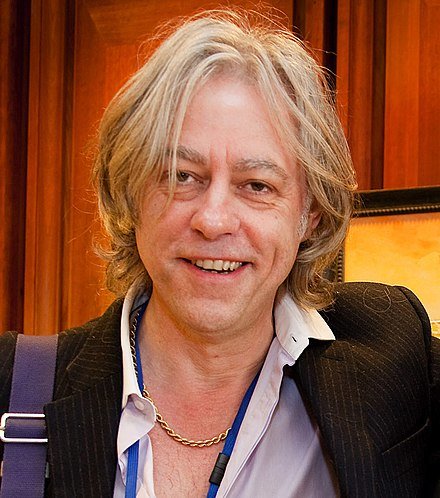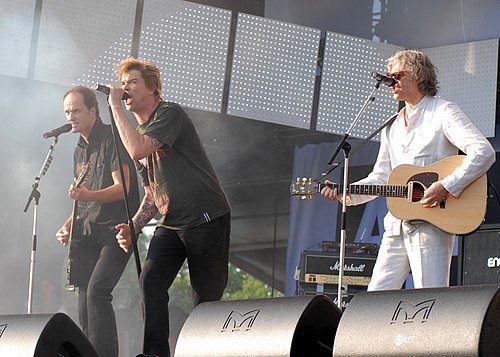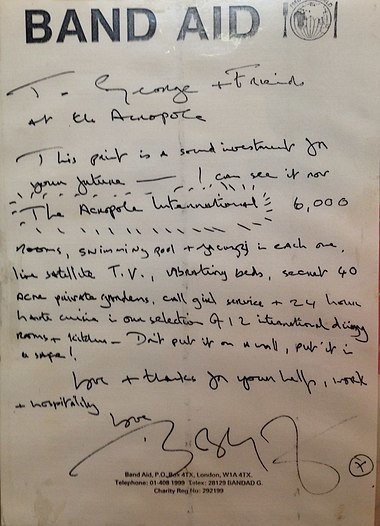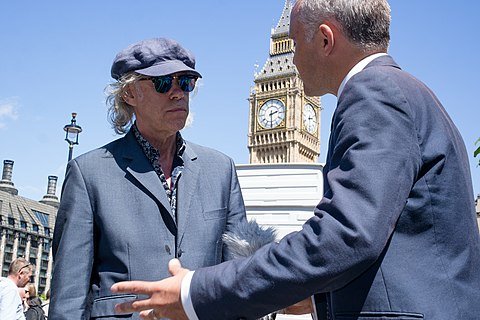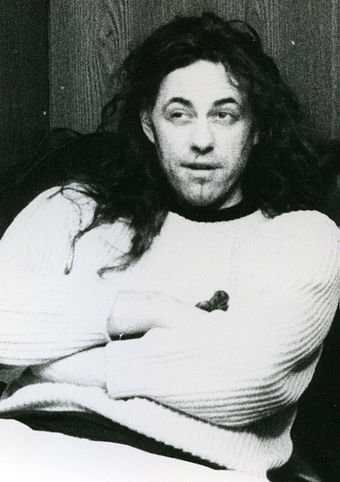British Heritage
Remember, Cherish, Learn.
beta
Bob Geldof
Contribution of Bob Geldof to British Heritage.
Bob Geldof, born Robert Frederick Zenon Geldof, is an Irish singer-songwriter, actor, and political activist, whose significant contributions to British heritage have left an indelible mark on the nation's cultural landscape. Rising to fame as the lead singer of the Irish rock band the Boomtown Rats during the late 1970s, Geldof played a pivotal role in the punk rock movement of the era. His influence extended beyond music, as he became a prominent political activist and a tireless fundraiser for various charitable causes.
Geldof's most remarkable legacy lies in his philanthropic efforts and activism, especially his dedication to addressing poverty and humanitarian crises in Africa. In 1984, together with Midge Ure, he founded the charity supergroup Band Aid, which aimed to raise funds for famine relief in Ethiopia. The group recorded the iconic single "Do They Know It's Christmas?", which became one of the best-selling singles of all time and symbolized the spirit of giving during the holiday season.
The following year, in 1985, Geldof organized the groundbreaking charity concert Live Aid, held simultaneously in London's Wembley Stadium and Philadelphia's John F. Kennedy Stadium. This unprecedented event brought together some of the world's biggest musical talents and raised over £150 million for famine relief in Africa. Live Aid not only showcased the power of music in driving positive change but also set a new standard for large-scale charitable events that continues to inspire generations of musicians and activists.
Geldof's dedication to the cause of poverty reduction in Africa led to him being granted an honorary knighthood (KBE) by Queen Elizabeth II in 1986. Though he is not a British citizen, he is often referred to as "Sir Bob" as a mark of respect for his significant contributions to British humanitarian efforts and the impact he has had on British society.
Bob Geldof's career as a musician achieved considerable success, particularly during his time with the Boomtown Rats. The band had UK number one hits with Geldof's compositions "Rat Trap" and "I Don't Like Mondays," making them the first new wave chart-toppers in Britain. Geldof's solo career also enjoyed moderate success, with hit singles like "This Is The World Calling" and "The Great Song of Indifference."
However, Geldof's most remarkable achievements lie in his philanthropic work and activism. Band Aid and Live Aid, in particular, stand as historic events that revolutionized the way artists and musicians engaged with global issues and humanitarian crises. Geldof's ability to mobilize the music industry and galvanize public support for critical causes is a testament to his influence and impact on British culture and society.
Bob Geldof was born on 5 October 1951 in Dún Laoghaire, Ireland, to parents Robert and Evelyn Geldof. He grew up in Ireland, and after facing various challenges early in life, including the death of his mother when he was only six, he later pursued a career in music and journalism.
His rise to fame began when he became the lead singer of the Boomtown Rats, a rock band that gained international recognition during the punk rock movement of the late 1970s. Their hit singles "Rat Trap" and "I Don't Like Mondays" solidified their place in British music history.
Geldof's activism and philanthropy started with his involvement in charity concerts and events to raise funds for famine relief in Ethiopia. He co-founded Band Aid, which subsequently led to the monumental Live Aid concert in 1985. These events brought together global artists and musicians to raise awareness and funds for those affected by famine and poverty in Africa.
Throughout his career, Geldof has been a vocal advocate for various causes, especially in addressing poverty, debt relief, and equitable development in Africa. His dedication to humanitarian work and social justice earned him numerous accolades and awards, including the Man of Peace title and the Brit Award for Outstanding Contribution to Music.
In his personal life, Geldof has faced triumphs and tragedies. He was married to the late Paula Yates, with whom he had three daughters: Fifi Trixibelle, Peaches Honeyblossom, and Pixie. After Yates' untimely death, Geldof became the legal guardian of her daughter with Michael Hutchence, Heavenly Hiraani Tiger Lily Hutchence (known as Tiger), and later adopted her.
Despite personal challenges, Geldof's unwavering commitment to making a positive impact on the world through his music, activism, and philanthropy has solidified his place as an influential figure in British heritage. His legacy continues to inspire generations to use their platforms for meaningful change and social progress.
Legacy and Contribution to British Heritage
Geldof's most remarkable legacy lies in his philanthropic efforts and activism, especially his dedication to addressing poverty and humanitarian crises in Africa. In 1984, together with Midge Ure, he founded the charity supergroup Band Aid, which aimed to raise funds for famine relief in Ethiopia. The group recorded the iconic single "Do They Know It's Christmas?", which became one of the best-selling singles of all time and symbolized the spirit of giving during the holiday season.
The following year, in 1985, Geldof organized the groundbreaking charity concert Live Aid, held simultaneously in London's Wembley Stadium and Philadelphia's John F. Kennedy Stadium. This unprecedented event brought together some of the world's biggest musical talents and raised over £150 million for famine relief in Africa. Live Aid not only showcased the power of music in driving positive change but also set a new standard for large-scale charitable events that continues to inspire generations of musicians and activists.
Geldof's dedication to the cause of poverty reduction in Africa led to him being granted an honorary knighthood (KBE) by Queen Elizabeth II in 1986. Though he is not a British citizen, he is often referred to as "Sir Bob" as a mark of respect for his significant contributions to British humanitarian efforts and the impact he has had on British society.
Success and Achievements
Bob Geldof's career as a musician achieved considerable success, particularly during his time with the Boomtown Rats. The band had UK number one hits with Geldof's compositions "Rat Trap" and "I Don't Like Mondays," making them the first new wave chart-toppers in Britain. Geldof's solo career also enjoyed moderate success, with hit singles like "This Is The World Calling" and "The Great Song of Indifference."
However, Geldof's most remarkable achievements lie in his philanthropic work and activism. Band Aid and Live Aid, in particular, stand as historic events that revolutionized the way artists and musicians engaged with global issues and humanitarian crises. Geldof's ability to mobilize the music industry and galvanize public support for critical causes is a testament to his influence and impact on British culture and society.
General Information about Bob Geldof
Bob Geldof was born on 5 October 1951 in Dún Laoghaire, Ireland, to parents Robert and Evelyn Geldof. He grew up in Ireland, and after facing various challenges early in life, including the death of his mother when he was only six, he later pursued a career in music and journalism.
His rise to fame began when he became the lead singer of the Boomtown Rats, a rock band that gained international recognition during the punk rock movement of the late 1970s. Their hit singles "Rat Trap" and "I Don't Like Mondays" solidified their place in British music history.
Geldof's activism and philanthropy started with his involvement in charity concerts and events to raise funds for famine relief in Ethiopia. He co-founded Band Aid, which subsequently led to the monumental Live Aid concert in 1985. These events brought together global artists and musicians to raise awareness and funds for those affected by famine and poverty in Africa.
Throughout his career, Geldof has been a vocal advocate for various causes, especially in addressing poverty, debt relief, and equitable development in Africa. His dedication to humanitarian work and social justice earned him numerous accolades and awards, including the Man of Peace title and the Brit Award for Outstanding Contribution to Music.
In his personal life, Geldof has faced triumphs and tragedies. He was married to the late Paula Yates, with whom he had three daughters: Fifi Trixibelle, Peaches Honeyblossom, and Pixie. After Yates' untimely death, Geldof became the legal guardian of her daughter with Michael Hutchence, Heavenly Hiraani Tiger Lily Hutchence (known as Tiger), and later adopted her.
Despite personal challenges, Geldof's unwavering commitment to making a positive impact on the world through his music, activism, and philanthropy has solidified his place as an influential figure in British heritage. His legacy continues to inspire generations to use their platforms for meaningful change and social progress.
- Bob Geldofen.wikipedia.org
